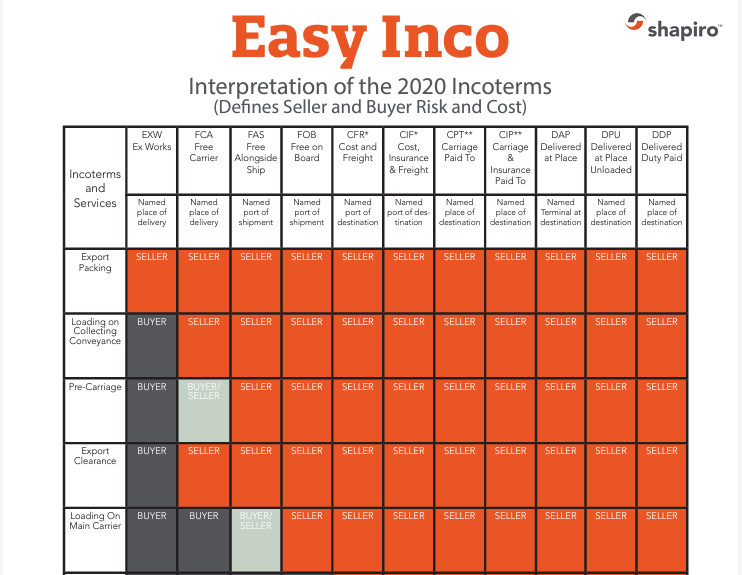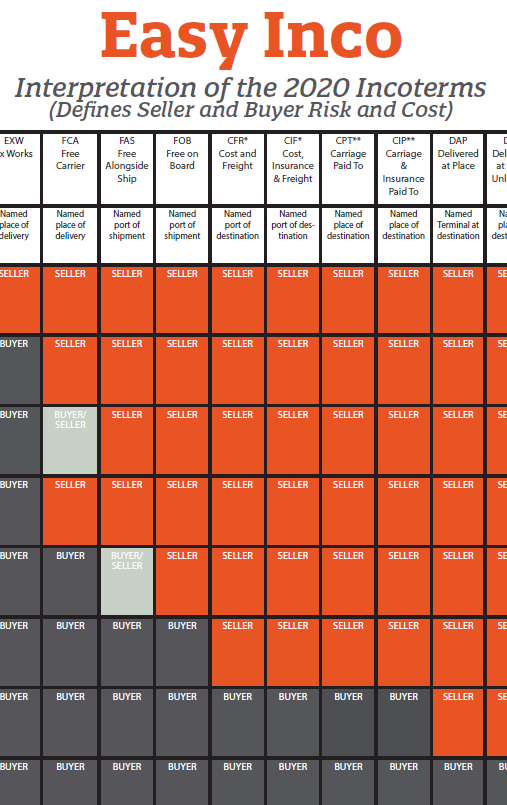Looking for the quiz answers?
(1. A; 2. B; 3. C; 4. B; 5. A; Bonus Question: You are not completely insulated. 19 USC 1592 provides that: No person may aid or abet the “introduction” of merchandise into the U.S. by means of false information or material omission. This is a very broad standard and CBP has pursued penalty against parties that were not the importer of record.)
Incoterms®, or International Commercial Terms, is a universally recognized set of definitions of international trade terms. “Incoterms” is a trademark of the International Chamber of Commerce (ICC). The ICC revises these terms every 10 years, with the latest version released in 2020.
Incoterms define the terms of shipment and delivery, as well as the transfer of risk, between the buyer and seller and, therefore, are crucial to international trade professionals on a daily basis. Incoterms are used in contracts for the sale of goods worldwide and provide guidelines to importers, exporters, attorneys, freight forwarders, insurers, and any other party involved in international trade. Proper usage of Incoterms can help avoid costly misunderstandings with your suppliers and customers.
*Risk of loss or damage is transferred from seller to buyer when the goods are loaded on the vessel.
**Risk of loss or damage is transferred from seller to buyer when the goods are delivered to the first carrier.
Notes :
- Incoterms must always be accompanied by a “named place” including city, province/state and country. The International Chamber of Commerce updates Incoterms every ten years, most recently in 2020. Because the implications and interpretations differ between publications, the year of the revised publication should also be stated. Example of correct Inco statement: “FOB Houston, Texas, USA, Incoterms 2020.”
- Incoterms identify risk and cost to the seller and buyer, but do not identify title transference.
- All reference to the cost of “Customs clearance” includes not only duty and /or other government levy but also the administrative cost associated with fulfilling that process.
- The exporter and/or importer may or may not be the seller or buyer. Exporter and importer status are specifically governed by the particular laws of the country of export and country of import.
2020 Incoterms Defined | |
EXW | Ex Works means that the seller delivers when he places the goods at the disposal of the buyer at the seller’s premises or another named place (i.e. works, factory, warehouse, etc.) not cleared for export and not loaded on any collecting vehicle. This term thus represents the minimum obligation for the seller, and the buyer has to bear all costs and risks involved in taking the goods from the seller’s premises. |
FCA | Free Carrier means the seller places goods available at the seller’s premises or location at the seller’s country of origin where the shipment begins or to the buyer’s appointed carrier terminal or CFS in the origin country, cleared for export. The buyer must contract at this own expense the carriage of the goods from the named place. |
FAS | Free Alongside Ship means that the seller delivers when the goods are placed alongside the vessel at the named port of shipment. This means that the buyer has to bear all costs and risks of loss of or damage to the goods from that moment. The FAS term requires the seller to clear the goods for export. This term is valid for non-containerized waterborne shipments or for vessel shipments where the loading cranes are located on the vessel itself. |
FOB | Free on Board means that the seller delivers the goods appropriately packed/placed onboard the buyer-designated vessel at the port on the seller’s side, cleared for export. This means that the buyer has to bear all costs and risks of loss of or damage to the goods from that point. The FOB term requires the seller to clear the goods for export. This term is valid for vessel shipments only. If the cargo is delivered to the carrier by the seller before the goods are loaded on board the vessel, then the FCA term should be used. This term is not to be used for FCL shipments and is reserved for charter breakbulk or bulk vessel shipments. |
CFR | Cost and Freight means that the seller delivers when the goods are loaded on board a vessel at the named port of shipment. The seller must pay the costs and freight necessary to bring the goods to the named port of destination BUT the risk of loss of or damage to the goods, as well as any additional costs due to events occurring after the time of delivery, are transferred from the seller to the buyer when the goods are loaded onto the vessel. The CFR term requires the seller to clear the goods for export. This term is valid for vessel shipments only. If the cargo is delivered to the carrier by the seller before the goods are loaded on board the vessel, then the CPT term should be used. This rule is generally unsuitable for containerized transport because at more ports containers are delivered to container yards at terminals rather on board ships. |
CIF | Cost, Insurance & Freight means that the seller delivers when the goods are loaded on board a vessel at the named port of shipment. The seller must pay the costs and freight necessary to bring the goods to the named port of destination BUT the risk of loss of or damage to the goods, as well as any additional costs due to events occurring after the time of delivery, are transferred from the seller to the buyer when the goods are loaded onto the vessel. The CIF term requires the seller to clear the goods for export and to provide minimum insurance coverage. This term is valid for vessel shipments only. If the cargo is delivered to the carrier by the seller before the goods are loaded on board the vessel, then the CIP term should be used. |
CPT | Carrier Paid To means that the seller delivers the goods to the carrier nominated by him but the seller must also pay the cost of carriage necessary to bring the goods to the named destination. This means that the buyer bears all risks and any other costs occurring after the goods have been so delivered. If multiple carriers are used for the carriage to the agreed destination, the risk passes when the goods have been delivered to the first carrier. The CPT term requires the seller to clear the goods for export. |
CIP | Carriage & Insurance Paid To means that the seller delivers the goods to the carrier nominated by him but the seller must also pay the cost of carriage necessary to bring the goods to the named place of destination. This means that the buyer bears all risks and any additional costs occurring after the goods have been so delivered. However, in CIP the seller also has to procure insurance against the buyer’s risk of loss of or damage to the goods during the carriage. Consequently, the seller contracts for insurance and pays the insurance premium. If multiple carriers are used for the carriage to the agreed destination, the risk passes when the goods have been delivered to the first carrier. The CIP term requires the seller to clear the goods for export. |
DPU | Delivered at Place Unloaded means the seller assumes all costs and risks until the goods are unloaded at the agreed named place at destination. The buyer is responsible for import customs formalities. DPU can apply to any, and more than one, mode of transport. The buyer and seller should specify and agree upon a named place of destination. DPU requires the seller to clear goods for export, without any obligation to clear for import. |
DAP | Delivered at Place means that the seller’s obligation ends when the goods are delivered to the disposal of the buyer at the named destination place. The DAP term specifies the buyer bears the risk and is responsible for unloading. The DAP term requires the seller to clear the goods for export and the buyer to clear the goods for import. If the seller is to be responsible for import clearance, then the DDP term should be used. |
DDP | Delivered Duty Paid means that the seller delivers the goods to the buyer, cleared for import, and not unloaded from any arriving means of transport at the named place of destination. The seller has to bear all the costs and risks involved in bringing the goods thereto including, where applicable, any “duty” (which term includes the responsibility for the risk of the carrying out of customs formalities and the payment of formalities, Customs duties, taxes and other charges) for import in the country of destination. If the parties wish the buyer to bear all risks and costs of the import, the DAP term should be used. |


